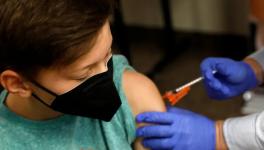How Far can Vaccines Halt Transmission of Delta Variant? New Study Shows Mixed Results

Image Courtesy: The Hindu
For quite some time now, the Delta variant of the novel coronavirus has emerged as the main variant behind new COVID-19 cases across the world. The Delta is a variant of interest pertaining to its more contagious character and ability to evade immune protection. Early studies into the variant pointed to its ability to escape vaccine protection, with some reflecting on its possible links with disease severity.
Research on different aspects of the Delta variant is going on in different laboratories across the world, especially focusing on the danger of an infection by the Delta variant and the efficacy of the vaccines against it. One such focus of research is to look at how well the vaccines could prevent the spread of the variant. A recent study published in the preprint server medRXiv has come out with mixed results.
On the upside, the study says that already-vaccinated people, if infected by the Delta variant, are less likely to spread the virus to their close contacts. However, the caveat is that this protective effect is relatively small and also wanes within a period as short as three months after the second shot is received.
The previous studies on the effectiveness of vaccines on the Delta variant have shown that people getting infected with the delta variant have the same levels of the viral load (level of viral material) in their noses, irrespective of whether they were previously vaccinated or not. This suggested that vaccinated and unvaccinated people might appear equally infectious. On the contrary, there are also studies that showed that vaccinated people are less likely to spread the virus even if they are infected by the Delta variant. The levels of the nasal virus amongst the vaccinated patients drop faster in comparison to those unvaccinated.
The latest study published in medRXiv further examined the effect of vaccines on the transmissibility of the variant. It analysed data from about 139,164 close contacts of 95,716 people infected by the coronavirus within the time period of January-August 2021. The study was conducted in the United Kingdom. Importantly, the time period chosen in the study had both Alpha and Delta variants in circulation, with both competing for dominance.
The researchers found that vaccines did offer some protection, both against infection and further transmission. Worryingly, people who were fully vaccinated and got infected by the Delta were twice as likely to transmit the virus as those infected with the Alpha variant. This is in addition to the fact that the risk of getting a breakthrough infection (infections taking place in vaccinated people) by Delta is higher than by Alpha.
The study also found that the efficacy of the vaccine in halting transmission wanes over time, to an almost negligible level. People vaccinated with the Oxford- AstraZeneca vaccine, if infected within two weeks after receiving the vaccine, are 57% likely to spread the virus (Delta variant) to unvaccinated close contacts. After 3 months of vaccination, this likelihood rose to 67%. This is particularly worrisome as the latter figure nearly equals the possibility that an unvaccinated person will spread the virus, indicating that after three months of vaccination the efficacy of halting transmissibility reduces to almost nil.
Similar was the case with the vaccine developed by Pfizer and BioNTech, with little deviation in the figures. The chance of transmission of the Delta variant by the breakthrough infection cases, soon after vaccination, was about 42%, which rose to 58% with time. So, in both vaccines, the risk of transmissibility increases over time.
This raises the concern of administering booster doses. However, experts have mixed views for the booster campaigns, with some believing that booster doses can be really effective while others say that even boosters have uncertainty.
Get the latest reports & analysis with people's perspective on Protests, movements & deep analytical videos, discussions of the current affairs in your Telegram app. Subscribe to NewsClick's Telegram channel & get Real-Time updates on stories, as they get published on our website.
























